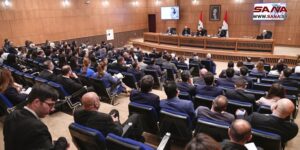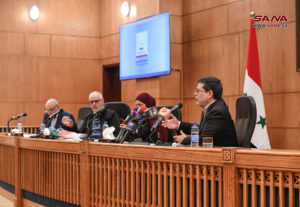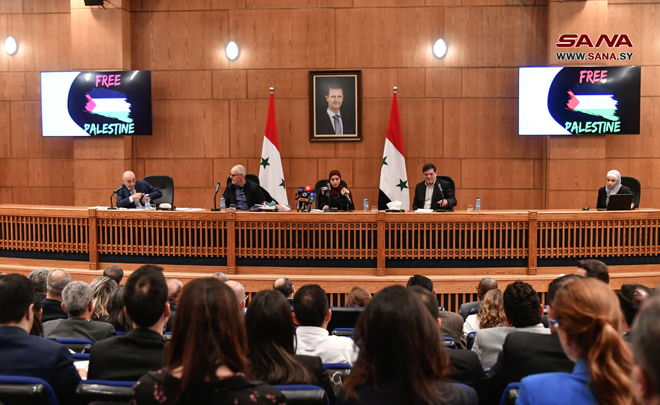“The Future of the Region”… Dialogue Seminar by the Diplomatic Institute at the Ministry of Foreign Affairs and Expatriates
The Diplomatic Institute at the Ministry of Foreign Affairs and Expatriates yesterday held a dialogue seminar, entitled “The Future of the Region”, at the ministry’s auditorium.
Australian writer Dr. Tim Anderson, professor of Political Science at the University of Sydney, explained in his presentation that by reviewing what has happened over the past years and the multiple American wars for a “new Middle East”, the vigilance of the peoples in the region for the danger of this scheme and the emergence of resistance, we find an effective and intelligent supporting front capable of changing equations and devising new confrontation strategies, some of which may be recognized by the Israeli entity but unable to weaken or reduce its scope.
 Anderson pointed out that it is crucial to restructure a multipolar global system to find viable alternatives to the Swift-dollar system, stressing the importance of solidarity and building alliances between sovereign countries in the region and taking advantage of this global change that is taking place now and the relations that bring together the countries of the region to build the security of their countries and their economic future.
Anderson pointed out that it is crucial to restructure a multipolar global system to find viable alternatives to the Swift-dollar system, stressing the importance of solidarity and building alliances between sovereign countries in the region and taking advantage of this global change that is taking place now and the relations that bring together the countries of the region to build the security of their countries and their economic future.
For his part, Iranian researcher and University professor Mohammad Marandi pointed out that the world is changing to a new multipolar world order, which gives more strength and more options to several countries in the region, including Syria and Iran, at the same time, the Zionist entity began to weaken as it did not achieve its goals in the war of genocide in Palestine for more than six months, and its image was shaken in front of the whole world, and it appeared as a brutal entity and revealed the face of the West supporting this entity for its authoritarian reality against human rights.
 Lebanese University professor Marwa Othman pointed out that what is happening today is an attempt to divide the Syrian map in order to steal resources in order to make the Peoples hostage and under the control of the West and its companies, indicating that the world is going through wars and crises, the most dangerous of which is economic war, including sanctions and unilateral measures reflected positively on the emergence of an intellectual, scientific, political and security renaissance in the region.
Lebanese University professor Marwa Othman pointed out that what is happening today is an attempt to divide the Syrian map in order to steal resources in order to make the Peoples hostage and under the control of the West and its companies, indicating that the world is going through wars and crises, the most dangerous of which is economic war, including sanctions and unilateral measures reflected positively on the emergence of an intellectual, scientific, political and security renaissance in the region.
In a statement to journalists, Dr. Imad Mustafa, director of the Institute, pointed out that the West is trying to redraw the future and map of this region, but we have our own resistant idea, our national project and our perspective for the future of our region.
Amal Farhat

